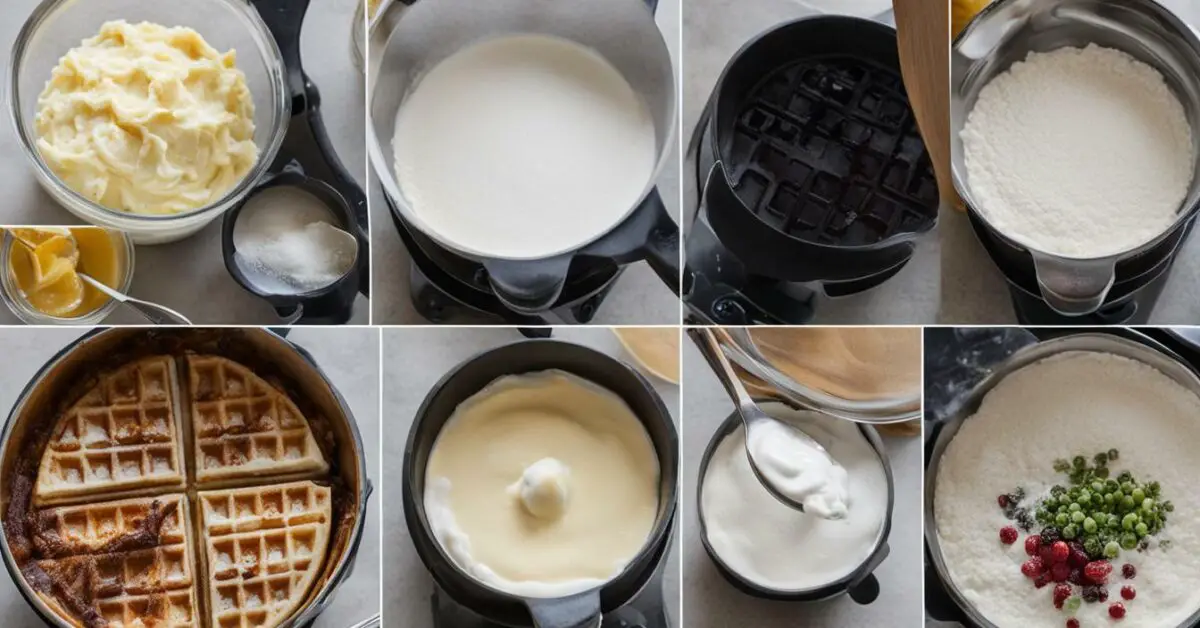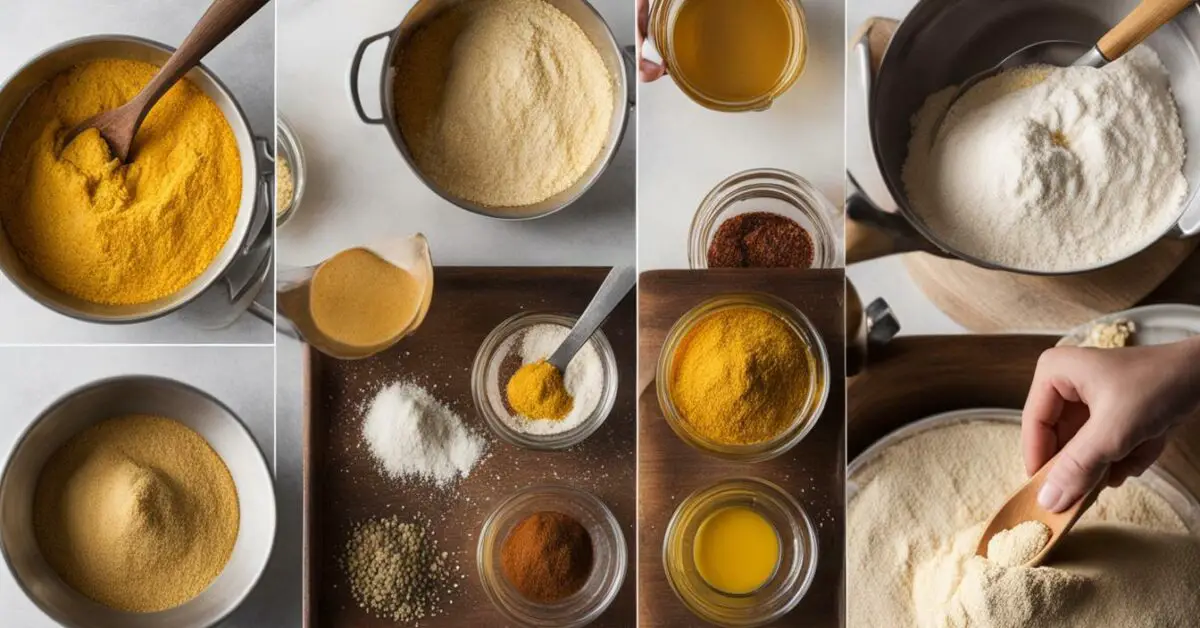
This post may contain affiliate links. Please read my disclosure for more information.
Discover seven effective ways to substitute for baking powder in donuts and create fluffy, savory treats without baking powder at home. There are several options that can easily replace baking powder in your donut recipes, allowing you to still achieve that light and airy texture. Whether you’re looking for a dairy-based alternative or a pantry staple option, these substitutes will help you create delicious donuts without compromising on taste or texture.
Key Takeaways:
- Cream of tartar and baking soda can be combined to replace baking powder in donuts, using a specific ratio.
- Buttermilk, with the addition of baking soda, can effectively substitute for baking powder in donuts.
- Plain yogurt, when used in the right proportions, can be a great alternative to baking powder in donut recipes.
- Sour milk, lemon juice, vinegar, and molasses can be combined with baking soda to create a substitute for baking powder in donuts with a unique flavor profile.
- Whipped egg whites can add volume to the batter and serve as a substitute for baking powder in donuts.
- Self-rising flour, which already contains baking powder and salt, can replace both all-purpose flour and baking powder in donut recipes.
Cream of Tartar and Baking Soda
One option for substituting baking powder in donuts is to combine cream of tartar and baking soda, creating a light and airy texture. Cream of tartar is an acid that, when combined with baking soda, creates carbon dioxide gas, which helps the donuts rise. To use this substitute, you will need to mix 2 teaspoons of cream of tartar with 1 teaspoon of baking soda for every 1 tablespoon of baking powder required in the recipe.
When incorporating cream of tartar and baking soda into your donut recipe, it’s important to note that these ingredients should be added to the dry ingredients. This allows for even distribution and activation of the leavening agents. The donut batter should be mixed thoroughly, ensuring that the cream of tartar and baking soda are evenly incorporated.
If you prefer a more visual representation, here is a table summarizing the measurements needed for using cream of tartar and baking soda as a substitute for baking powder:
| Cream of Tartar | Baking Soda | Baking Powder Equivalent |
|---|---|---|
| 2 teaspoons | 1 teaspoon | 1 tablespoon |
By using cream of tartar and baking soda as a substitute for baking powder in your donuts, you can achieve a light and fluffy texture without compromising on taste.
Buttermilk and Baking Soda
Another effective alternative for baking powder in donuts is buttermilk combined with baking soda, resulting in moist and fluffy treats. Buttermilk not only adds tanginess to the donuts but also helps in creating a tender texture. When combined with baking soda, it creates a leavening effect similar to baking powder.
To substitute for 1 teaspoon of baking powder, you can use 1/4 teaspoon of baking soda with the dry ingredients and 1/2 cup of buttermilk with the wet ingredients. The baking soda reacts with the buttermilk’s acidity to produce carbon dioxide bubbles, which help the donuts rise. It’s important to note that buttermilk is thicker than regular milk, so adjust the recipe accordingly.
To incorporate buttermilk and baking soda into your donut recipe, simply follow the instructions as you would when using baking powder. Mix the dry ingredients, including the baking soda, in a bowl. In a separate bowl, combine the wet ingredients, including the buttermilk. Gradually add the wet ingredients to the dry ingredients while gently stirring until just combined. Then, proceed with the rest of the donut-making process, such as frying or baking.
| Ingredient | Amount |
|---|---|
| Baking Soda | 1/4 teaspoon |
| Buttermilk | 1/2 cup |
Plain Yogurt: A Tangy and Moist Substitute for Baking Powder in Donuts
Using plain yogurt in place of baking powder adds tanginess and moisture to your donut batter. It can be a fantastic alternative for those looking to infuse their donuts with a unique flavor twist. To substitute baking powder with plain yogurt, simply follow the same measurements as using buttermilk.
Here’s a simple conversion ratio: for every 1 teaspoon of baking powder, add 1/4 teaspoon of baking soda to the dry ingredients, and 1/2 cup of plain yogurt to the wet ingredients. This combination helps the donuts rise and achieve a light and fluffy texture.
When substituting baking powder with plain yogurt, it’s important to note that the tanginess of the yogurt may alter the overall flavor of your donuts. However, this can be a delightful enhancement, especially when paired with fruity or citrus-flavored donuts.
Table: Baking Powder Substitutes Using Plain Yogurt
| Baking Powder | Baking Soda | Plain Yogurt |
|---|---|---|
| 1 teaspoon | 1/4 teaspoon | 1/2 cup |
Experimenting with substitutes for baking powder in donuts allows you to create unique flavor profiles and cater to personal preferences. Whether you’re looking for a tangy twist or moisture-rich texture, plain yogurt can be an excellent choice. Don’t be afraid to get creative in the kitchen and enjoy the delicious results!
Sour Milk, Lemon Juice, Vinegar, and Molasses with Baking Soda
Using sour milk, lemon juice, vinegar, or molasses in combination with baking soda can create a delicious alternative to baking powder in your donut recipe. These ingredients react with the baking soda to release carbon dioxide, resulting in fluffy and light donuts. Here’s how you can use each of these substitutes:
- Sour Milk: To make sour milk, simply add 1 tablespoon of lemon juice or vinegar to 1 cup of milk. Let it sit for a few minutes until it curdles. Then, use 1/2 cup of sour milk and 1/4 teaspoon of baking soda for every 1 teaspoon of baking powder in your recipe.
- Lemon Juice: Add 1 teaspoon of lemon juice and 1/2 teaspoon of baking soda for every 1 teaspoon of baking powder in your donut recipe. The tangy flavor of lemon juice adds a refreshing twist to your donuts.
- Vinegar: Similar to lemon juice, vinegar can also be used to replace baking powder in donuts. Use 1/2 teaspoon of vinegar and 1/4 teaspoon of baking soda for every 1 teaspoon of baking powder called for in the recipe. The acidity in vinegar helps the donuts rise and become light and fluffy.
- Molasses: For a slightly sweet and rich flavor in your donuts, you can use molasses as a substitute for baking powder. Combine 1 tablespoon of molasses with 1/4 teaspoon of baking soda for every 1 teaspoon of baking powder in your recipe.
Make sure to mix these substitutes with the dry ingredients in your donut recipe. They will react with the baking soda once the wet ingredients are added, creating the desired leavening effect.
| Baking Powder | Sour Milk + Baking Soda | Lemon Juice + Baking Soda | Vinegar + Baking Soda | Molasses + Baking Soda |
|---|---|---|---|---|
| 1 teaspoon | 1/2 cup sour milk 1/4 teaspoon baking soda | 1 teaspoon lemon juice 1/2 teaspoon baking soda | 1/2 teaspoon vinegar 1/4 teaspoon baking soda | 1 tablespoon molasses 1/4 teaspoon baking soda |
Experimenting with these substitutes can add a unique flavor profile to your donuts while still achieving the desired texture. Whether you prefer the tanginess of lemon juice or the richness of molasses, there’s a substitute to suit your taste preferences. Enjoy creating delicious donuts without baking powder!
Whipped Egg Whites as a Substitute for Baking Powder in Donuts
Whipped egg whites can add volume and lightness to your donut batter, making them a great alternative to baking powder. By incorporating whipped egg whites into the recipe, you can achieve fluffy donuts that have a delicate texture.
To use whipped egg whites as a substitute for baking powder, start by separating the egg whites from the yolks. Then, using an electric mixer or whisk, beat the egg whites until they reach stiff peaks. This means that when you lift the beaters or whisk, the egg whites hold their shape and do not collapse.
Once the egg whites are whipped, gently fold them into the donut batter. Be careful not to overmix, as this can cause the egg whites to deflate and result in denser donuts. The whipped egg whites will provide the necessary leavening action, giving your donuts a light and airy texture.
| Ingredients | Measurements |
|---|---|
| All-purpose flour | As per recipe |
| Granulated sugar | As per recipe |
| Egg yolks | As per recipe |
| Whipped egg whites | 3/4 cup |
| Vanilla extract | As per recipe |
| Butter | As per recipe |
When using whipped egg whites as a substitute for baking powder, it’s important to adjust the other ingredients in your recipe accordingly. Since the whipped egg whites add volume to the batter, you may need to reduce the amount of other liquids, such as milk or buttermilk, to maintain the desired consistency.
Experimenting with whipped egg whites can be a fun and creative way to elevate your donut recipes. It offers a natural leavening option without the need for baking powder. So, the next time you’re baking donuts and find yourself without baking powder, give whipped egg whites a try!
Self-Rising Flour
Using self-rising flour eliminates the need for baking powder in your donut recipe, as it already contains the leavening agent. This type of flour is a convenient option for those who want to simplify their baking process without compromising the fluffy texture of their donuts. Made by combining all-purpose flour with baking powder and salt, self-rising flour provides the necessary rise and structure for your homemade treats.
To use self-rising flour in your donut recipe, you can simply substitute it for the all-purpose flour and baking powder called for in the original recipe. However, it’s important to note that self-rising flour already contains added salt, so you may need to adjust the amount of salt used in your recipe accordingly.
When using self-rising flour, it’s essential to follow the recipe instructions carefully and avoid overmixing the batter. Overmixing can result in dense and tough donuts. Additionally, remember to preheat your oven to the recommended temperature and monitor the baking time closely to achieve perfectly golden and fluffy donuts.
| Ingredients: | Measurement: |
|---|---|
| Self-rising flour | 1 cup |
| Salt (if recipe calls for it) | Adjust as needed |
| Other recipe ingredients | Follow original recipe |
Conclusion
By utilizing these effective alternatives, you can create delicious donuts without baking powder, allowing you to enjoy fluffy treats anytime. There are several options available when it comes to substituting baking powder in donuts.
One option is to use a combination of cream of tartar and baking soda. For every 1 tablespoon of baking powder required, use 2 teaspoons of cream of tartar and 1 teaspoon of baking soda. This combination creates the necessary leavening power to achieve fluffy donuts.
Another alternative is to use buttermilk. Add 1/4 teaspoon of baking soda to the dry ingredients and 1/2 cup of buttermilk to the wet ingredients for every 1 teaspoon of baking powder called for in the recipe. The acidity in buttermilk reacts with the baking soda to create the desired rise in the donuts.
If you don’t have buttermilk on hand, plain yogurt can also be used. Follow the same measurements as buttermilk, adding 1/4 teaspoon of baking soda with the dry ingredients and using 1/2 cup of plain yogurt with the wet ingredients for every 1 teaspoon of baking powder.
Sour milk, lemon juice, vinegar, and molasses can also be combined with baking soda to substitute for baking powder. Experiment with the ratios to find the right balance of flavor and leavening power.
Whipped egg whites can add volume to the donut batter and act as a substitute for baking powder. Incorporate whipped egg whites into the batter to achieve light and airy donuts.
Lastly, self-rising flour can be used instead of all-purpose flour and baking powder. It already contains baking powder and salt, so you can omit the baking powder and salt called for in the recipe.
With these alternatives, you can create scrumptious donuts without the need for baking powder. Enjoy experimenting with different flavors and techniques to find your perfect fluffy treat!
FAQ
What are some effective ways to substitute for baking powder in donuts?
There are several alternatives that can be used as substitutes for baking powder in donuts. Some options include cream of tartar and baking soda, buttermilk and baking soda, plain yogurt, sour milk, lemon juice, vinegar, molasses with baking soda, whipped egg whites, and self-rising flour.
How do I use cream of tartar and baking soda as a substitute for baking powder in donuts?
To use cream of tartar and baking soda, combine 2 teaspoons of cream of tartar and 1 teaspoon of baking soda for every 1 tablespoon of baking powder called for in the recipe.
What is the method for using buttermilk and baking soda as a substitute for baking powder in donuts?
When using buttermilk and baking soda, add 1/4 teaspoon of baking soda with the dry ingredients and 1/2 cup of buttermilk with the wet ingredients for every 1 teaspoon of baking powder required in the recipe.
Can I use plain yogurt as a substitute for baking powder in donuts?
Yes, plain yogurt can be used as a substitute for baking powder in donuts. Use the same measurements as when using buttermilk – 1/4 teaspoon of baking soda with the dry ingredients and 1/2 cup of plain yogurt with the wet ingredients for every 1 teaspoon of baking powder.
How can I substitute baking powder in donuts using sour milk, lemon juice, vinegar, or molasses?
You can combine sour milk, lemon juice, vinegar, or molasses with baking soda to substitute for baking powder in donuts. The ratios will vary, so it’s important to follow a recipe or guideline. Generally, you’ll need to add about 1/2 teaspoon of baking soda and the corresponding amount of sour milk, lemon juice, vinegar, or molasses to replace 1 teaspoon of baking powder.
Can whipped egg whites be used as a substitute for baking powder in donuts?
Yes, whipped egg whites can be used to add volume to the donut batter and can serve as a substitute for baking powder. Whip the egg whites until they form stiff peaks and then fold them into the batter as directed in the recipe.
Is self-rising flour a suitable substitute for baking powder in donuts?
Yes, self-rising flour can be used as a substitute for both all-purpose flour and baking powder in donuts. Since self-rising flour already contains baking powder and salt, you can omit the additional baking powder and salt called for in the recipe.


